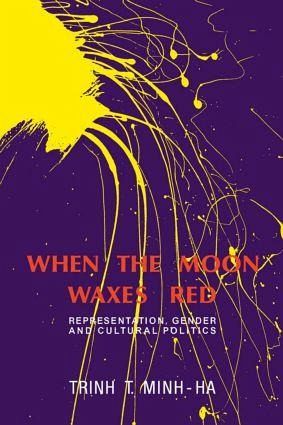
When the Moon Waxes Red
Representation, Gender and Cultural Politics
Versandkostenfrei!
Sofort lieferbar
40,99 €
inkl. MwSt.

PAYBACK Punkte
20 °P sammeln!
In this new collection of her provocative essays on Third World art and culture, Trinh Minh-ha offers new challenges to Western regimes of knowledge. Bringing to her subjects an acute sense of the many meanings of the marginal, she examines topics such as Asian and African texts, the theories of Barthes, questions of spectatorship, the enigmas of art, and the perils of anthropology.When the Moon Waxes Red is an extended argument against reductive analyses, even those that appear politically adroit. The multiply-hyphenated peoples of color are not simply placed in a duality between two cultural...
In this new collection of her provocative essays on Third World art and culture, Trinh Minh-ha offers new challenges to Western regimes of knowledge. Bringing to her subjects an acute sense of the many meanings of the marginal, she examines topics such as Asian and African texts, the theories of Barthes, questions of spectatorship, the enigmas of art, and the perils of anthropology.
When the Moon Waxes Red is an extended argument against reductive analyses, even those that appear politically adroit. The multiply-hyphenated peoples of color are not simply placed in a duality between two cultural heritages; throughout, Trinh describes the predicament of having to live "a difference that has no name and too many names already." She argues for multicultural revision of knowledge so that a new politics can transform reality rather than merely ideologize it. By rewriting the always emerging, already distorted place of struggle, such work seeks to "beat the master at his own game."
When the Moon Waxes Red is an extended argument against reductive analyses, even those that appear politically adroit. The multiply-hyphenated peoples of color are not simply placed in a duality between two cultural heritages; throughout, Trinh describes the predicament of having to live "a difference that has no name and too many names already." She argues for multicultural revision of knowledge so that a new politics can transform reality rather than merely ideologize it. By rewriting the always emerging, already distorted place of struggle, such work seeks to "beat the master at his own game."














